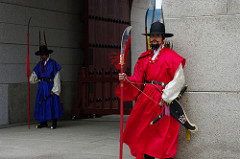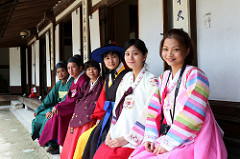Archive by Author
Shall we…? in Korean Posted by Soo on Feb 22, 2016

Today, you will learn how to say “Shall we?” in Korean. The grammar point is “V.S. + (을) 까요?” You can use this expression to pretty much anyone because this is polite and kindness way to express “Shall we” in Korean. I often say to my co-worker who is older than me, “Shall we go…
How to say “let’s” in Korean (Part 3) Posted by Soo on Feb 15, 2016

Today, you will learn the last way to say “Let’s” in Korean which is what I like to use a lot as a teacher. The grammar pattern is V.S. + 읍(ㅂ) 시다. Using 읍시다 is not for you if you are not in higher level than others. For instance, teacher, boss, supervisor, manager can use 읍시다 to their employees and…
How to say “let’s” in Korean (Part 2) Posted by Soo on Feb 8, 2016

As I said in the last week that there are about three ways to say “Let’s” in Korean. Today, you are going to learn “같이 + 요” which is appropriated using in casual formal situation; it can be used to people older than you or stranger. The grammar pattern is “같이 + V.S. + (어) 요”. “같이/ Godchi” means…
How to say “let’s” in Korean Posted by Soo on Feb 1, 2016

There are about three ways to say “Let’s” in Korean. Today, you are going to learn “자/ Ja” which is appropriated using in informal situation; you don’t want to use to older people or stranger. This is good to have with your friend. The grammar pattern is “V.S. + 자”. It is always good to learn new…
Korean Verb Endings: 군요 GunYo Posted by Soo on Jan 25, 2016

Today, you are going to learn verb ending “군요/ GunYo ” which expresses surprise and strong feeling such a wow. In my personal opinion, Korean women use “군요/ GunYo ” more than Korean men just like the last blog ending verb #3. So, it sounds like more kind and friendly. Let’s learn how to use…
Korean verb endings: 나요 Nayo Posted by Soo on Jan 18, 2016

Today, you will learn another verb ending which is “나요/Nayo” which expresses one’s wondering and supervise; it is for interrogative sentences and exclamation. The grammar pattern is “Verb + 나요 (먹다 + 나요 = 먹나요)”. When you use this verb ending, it sounds like you have really good Korean skills. In my personal opinion, more…
Korean Verb Endings: 네요 Posted by Soo on Jan 11, 2016

Today, you are going to learn one of most common verb ending “네요/Nae yo/”. It is a verb ending and an exclamation. For instance, I didn’t know: 몰랐네요 instead of 몰랐어요. It is the same meaning of “I didn’t know”, but the sounds will be different when you hear in Korean. Please read more examples…


